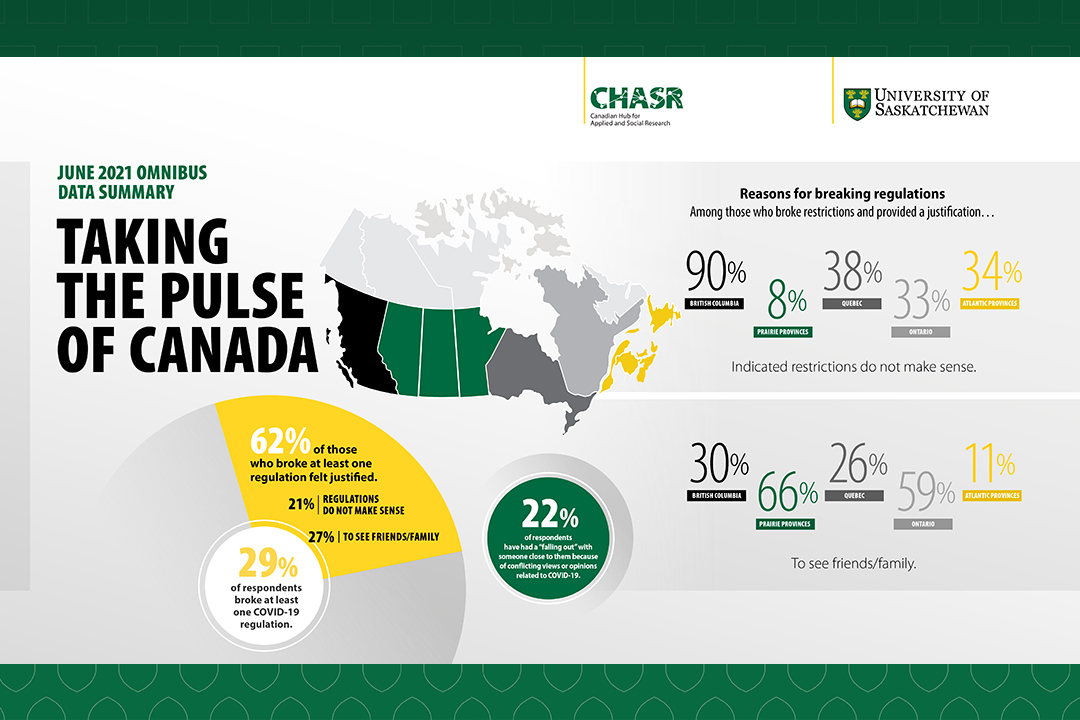
USask research finds many Canadians broke COVID rules, and tensions grew in relationships
SASKATOON — Nearly one in three Canadians have flouted public health guidelines on COVID-19, justifying it mostly to see friends or family. Meanwhile, more than one in five have had a falling out with friends or family members because of conflicting views on the pandemic.
By USASK RESEARCH PROFILE AND IMPACTThese findings are highlights of a Taking the Pulse of Canada, a quarterly national survey conducted by the University of Saskatchewan’s (USask) Canadian Hub for Applied and Social Research (CHASR). The study received responses from 1,000 Canadians contacted between June 1 and June 15 via landlines and cellphones.
They were asked about their adherence to COVID-19 restrictions, justification for breaking rules, their sources for pandemic information, and the impact their views on the pandemic had on personal relationships.
“There is a lot of useful data here—interesting, reflective and retrospective information provided by Canadians—that will play a role and help inform how we continue to manage the current pandemic and deal with future pandemics,” said Jason Disano, director of CHASR.
“For example, if you look at the extent to which people were not adhering to the various public health guidelines, that could help inform policymakers on what works, what doesn’t work, and what should be a guideline versus what should be a recommendation versus what should be an actual restriction.”
In all, 29 per cent respondents broke at least one pandemic regulation. Of these, 16 per cent flouted indoor gathering limits, 11 per cent didn’t heed outdoor gathering limits, and 12 per cent didn’t wear masks in outdoor public spaces.
Meeting friends or family (27 per cent) topped the reasons for contravening rules, followed by regulations don’t make sense (21 per cent), and violated rules in a “safe” way (17 per cent).
Disano said the latter category was created post-survey. This is because many rule breakers who answered “other reason” for their behaviour cited justifications such as believing it was safe since they were alone or socially distanced outdoors, or were fully vaccinated and didn’t consider themselves as posing a risk.
The survey found that people younger than 35 were more likely to break indoor gathering limits, while those under age 55 were more likely to defy outdoor gathering limits. Residents of Quebec (22 per cent) and the Prairies (24 per cent) were more likely than other Canadians to ignore indoor gathering limits.
There were distinct regional differences uncovered by the survey. Among rule breakers, British Columbians by far (90 per cent) justified themselves by saying the regulations didn’t make sense. Just eight per cent of Prairie residents felt that way. Meanwhile, seeing friends/family was a more common justification among women (62 per cent versus 30 per cent of men), and residents of Quebec and the Prairies (59 per cent and 66 per cent respectively) compared to 11 per cent of Atlantic Canadians.
Asked about their sources of COVID-19 news, 88 per cent said they got the information online or from TV news, and about 70 per cent cited word-of-mouth or government websites. Social media and print sources such as newspapers were cited by slightly more than a third of respondents.
Of the 35 per cent who got COVID news from social media, Facebook was the main source for 63 per cent (or about 220 people), while 38 per cent (133 people) listed Twitter. About 50 respondents said TikTok was a source, and three listed Tumblr.
Those over age 55 used printed media more commonly, while Twitter ranked higher among those under 55. Instagram, Reddit, Snapchat and TikTok are more common news sources for those under 35.
“There’s no primary source for Canadians’ information on the COVID-19 pandemic,” said Disano. “It really behooves governments and those responsible for communicating pandemic messages to the public to ensure that they are hitting all the demographic groups of the population.”
The results of the survey yield a margin of error of +/- 3.1 per cent nationally (19 times out of 20, meaning the results can be considered reliable 95 per cent of the time).
Find the full Taking the Pulse of Canada results here.
For more information, contact:
Victoria Dinh
USask Media Relations
306-966-5487
victoria.dinh@usask.ca

